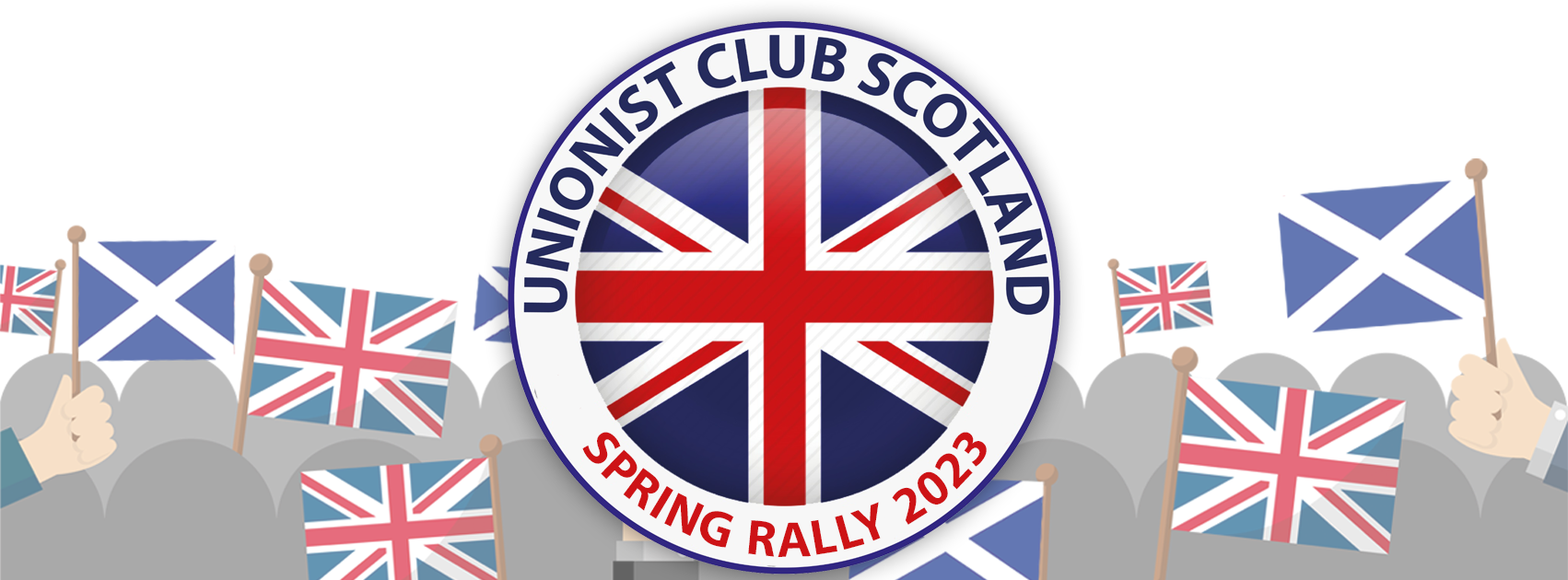

Speech to the Scottish Unionist Clubs Spring rally – Glasgow 12th March
“I speak to you at a time of opportunity for Unionism in Scotland, but the opportunity will only be realised if the hard work is put in on the ground and I want to acknowledge the hard groundwork that goes on through the Unionist Clubs here in Scotland. There is a great opportunity and with it comes great responsibility – the Unionist family cannot be complacent but rather must seize the day and advocate for the great cause that unites us all – the United Kingdom.
Today I wanted to put forward the case for plain and simple Unionism; not the Unionism of one political party or another, just straight forward Unionism. We all know that loyalty to one political party or another whilst laudable and indeed I would say as a former party leader necessary, but when looking at what unites us rather than what divides us it is time not to argue for one particular brand over another but rather what is the core message of Unionism that unites us.
After I left the Stormont Assembly and local politics, I decided to set up a Foundation with some like-minded people to try and look for the core of Unionism, not just in Northern Ireland, the epi centre of all as we know, but rather United Kingdom wide Unionism. What is it that brings together Unionists from across the United Kingdom regardless of where they live? The foundation is called the Together UK Foundation and we have had our Belfast and London launch and are looking forward to our Scottish launch soon, followed on by our launch in Wales.
Opponents of Unionism try to reduce it down to one thing or another. For some it is Orange, Protestant, old fashioned, outdated, conservative and against change.
There is no point in rejecting criticism out of hand, however much we may dispute it, we have to listen, acknowledge where it is justified and then rectify and move on.
We may indeed, I think it is fair to say, have an image problem, but Unionism is not narrow, or able to be reduced down to one thing or another, rather it is a wide, diverse rational political ideal unlike separatism which is narrowly based. When you look at Unionism from a UK point of view rather than just an NI or solely Scottish point of view it overcomes a lot of these labels.
In the 1940s, C.S Lewis the great Belfast Christian apologist and novelist was asked by the BBC to explain the concept of Christianity to their listeners. It was a great success as he broke down the Christian faith into easy to understand chunks.
If we were asked by the BBC today, just as Lewis was in the 1940s about Christianity, to come on a series of radio programmes and talk about the concept of Unionism, where would we start, what would be the core argument, how would we convince those who currently oppose or simply don’t care that it is a cause worth supporting?
Just like Christians and denominations, each of us as Unionists have a preferred party, but can we set aside our party preferences and allegiances and explore mere Unionism?
Can we see our political philosophy, Unionism with fresh eyes?
And importantly can we articulate the case in a straightforward easy to understand way to those who don’t understand it- or don’t want to understand it?
For many Unionists’ republicanism seem to have a momentum and a simple message – a “United Ireland” or an “Independent Scotland” will solve all of the ills of society we are told and anyway we might as well have the conversation about a United Ireland or Independent Scotland as it is inevitable that it will happen. This is a comfortable belief for the followers of republicanism across the UK that allows each generation to think that with one last heave, or one last push that independence will happen. For us in Northern Ireland we have retained the UK against fierce opposition for over 100 years, so the historicism or inevitability argument hasn’t worked.
In fact both of the assertions – that all problems will be solved and that it is coming around the next corner – are both nonsenses, but yet they are allowed to gain traction and the narrative from media is that we should engage with the conversation because change is coming. We should always push back against the narrative and instead move to the narrative of why the United Kingdom is good for all.
When C.S.Lewis was explaining Christianity to the BBC listeners back in the 1940s, he talked about the simplicity of atheism but actually when you look behind it there were many complicated questions that could not be answered by it. Likewise, separatism may appeal as a simple strap line but doesn’t answer some of the critical questions that need answering.
Unionism should not pretend to be simple but rather multi-faceted and addressing many questions. Unionism is not narrow or reductionist but broad and diverse and that is its strength.
The challenges which Unionism faces will evolve with each generation. The rallying cries of no Rome rule may have been appropriate and relevant in 1921, as shown by what happened in the republic after partition including the framing of the Irish constitution of 1937 by the Roman Catholic church, but that slogan is not relevant today in a different social environment.
I am hugely proud to be British. But our Britishness is about much more than the passport we hold. It cannot and should not be reduced down to a name or a badge. It is about a shared history going back generations. Pride in a United Kingdom which ended the slave trade, was the home of the industrial revolution and which founded the welfare state. It is about the institutions we cherish which are the envy of others.
Our allegiance to our shared institutions whether in the field of culture, our historic ties that bind or in wider society also give us a sense of togetherness that is important for our emotional connection to the UK.
Our pride in our role for good in the world, is also tangible, not just two world wars and the struggle against communism in the past but the battle for freedom and democracy today particularly in Ukraine.
Our place in the world is not just important for us from a defence, security and intelligence point of view. It is also important for countries like the United States, Canada, Australia and New Zealand – our allies in the Five eyes intelligence community. If the United Kingdom was broken up by separatists, then what would happen to our safety and security? And that of the wider western alliance?
What knits us together isn’t a common political creed, one religion or the same skin colour.
We are bound together by a set of common values, like democracy, freedom, respect for the rule of law and tolerance for others. For us these things do not need to be codified in a written constitution, they are the beating heart of who we are as a society and what makes us British.
There is no doubt that our country has been enhanced by the people who over decades have come to our shores. The fact that to this day the UK remains a beacon attracting people from all over the globe to work, settle and to make their lives tells us more about our country than any other statistic really can. We must engage all the supporters of the Union regardless of whether we differ on secondary points.
We need to harness the talents and energy of all which is why I am so delighted that some of the strongest and most active people involved in Together UK Foundation are those from the Indian community in Great Britain. They are not embarrassed about their patriotism to the UK, in fact some of them cannot understand why some of us are so cautious about out great country. I look forward to building the widest coalition possible to advocate for the UK.
And the Union has allowed people from all its parts to make a contribution in political, social and cultural life.
I know that some like to present Northern Ireland’s relationship with the rest of the United Kingdom as one of more “take” than “give”. Certainly, in an economic sense the UK has allowed the sharing of wealth and prosperity not just between people but also across the country and NI has been a huge beneficiary of that. This pooling of resources across the UK is one of its great attractions but it’s not just about financial support even though that is particularly important.
My belief and support for the Union does not depend on economic arguments, although it is overwhelming the case that we are economically better off together than apart.
Northern Ireland’s businesses and people pay into the Exchequer like their counterparts in every part of the Kingdom, but our contribution to the UK cannot simply be measured in pounds and pence alone.
In every field, military leadership, cultural life, and scientific advances as well as our brilliant entrepreneurs we have more than played our part. We can exert an influence and have a voice which goes well beyond our size would otherwise merit.
These are the common threads that unites the argument for Unionism.
When the Acts of Union in Ireland came into being under the guardianship of the great Viscount Castlereagh as he then was, the main focus was on trade and the internal market of the Kingdom . How telling that, that element, trade is still so important today. Great Britain is still by far the main market for our goods and our supply chains are inextricably linked to the rest of the UK. Before the Protocol took hold 72% of trade in and out of Belfast harbour is to GB compared to less than one fifth to the EU. There has now been some diversion of trade but even despite the protocol, GB is the main market for our goods and source of incoming goods.
But as I hope I have shown in this talk today the Union is much more than trade and economics, even though they are hugely important. It is about solidarity, the pooling of risks as well as resources, best illustrated recently by our access to the covid vaccines across the UK at the same time regardless of where we lived. The Union is about mutual support and sharing. It is about allegiance to shared institutions and it is about our place on the world stage. Our safety, stability, security and success depend on the Union.
Simple, straight forward Unionism has a compelling case – we just need to make it.”

